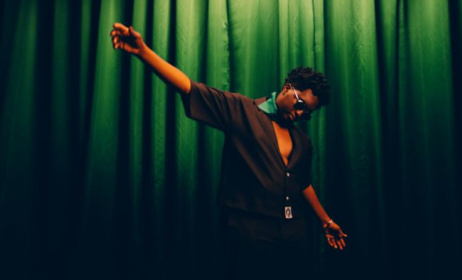How Wikiendi Live is promoting live music in Tanzania
South Africa’s live music development project, Concert SA recently released a report that showed live music had overtaken recorded music as a source of revenue, opening up multiple opportunities for local venues and music organizers. While there are indications that the South African live music scene is set to grow, in Tanzania, live music, once a vibrant segment of the industry, has taken a downward spiral over the years.
 Leo Mkanyia during a performance. Photo by Quaint Photography
Leo Mkanyia during a performance. Photo by Quaint Photography
Few initiatives such as Wikiendi Live, a monthly live music showcase, are striving to change the fortunes of the Tanzanian live music segment.
“In the 1980s, the recording industry barely existed in Tanzania, and for those old enough to remember, the live music scene was electrifying,” says Aziza Ongala, the coordinator of Wikiendi Live.
Challenges such as lack of venues and other key elements necessary for production of live music events have, however, held back this segment which is regarded as the highest earning activity in the music sector value chain.
Rebecca Correy, the Managing Director at Nafasi Art Space, says, "There are definitely not enough venues to cater for such events. Bands are still very much limited to playing in local bars, where there is unusually no cover charge, this in turn limits their earning capacity. Consequently, there hasn’t been an upsurge of young talent to replace the large dinosaur band of the 1980s.”.
Wikiendi Live was established in May 2016 to boost the visibility of Tanzanian and East African artists who play traditional or African fusion music. Nafasi Art Space has always played home to this monthly event.
Besides offering a platform for artists, Wikiendi Live hopes to contribute to the establishment of an East African tour circuit that links venues in order to reduce or share costs and increase opportunities for artists to play multiple shows in the region. Additionally, the platform hopes to create professional and artistic development opportunities for Tanzanian artists while building the technical capacity for those who operate in the Tanzanian music industry.
“We target artists who are not mainstream acts and so the platform allows them to define themselves and their art outside of commercial expectations. Local Tanzanian acts gain an opportunity to play alongside visiting artists from the region,” Ongala remarks.
She says this will in turn encourage collaboration and contribute to the professionalization of local Tanzanian artists. On 26 November, Wikiendi Live will host the last edition for this year. In concert will be Tanzanian Swahili Blues artist Leo Mkanyia and the Wahapahapa band.
Mkanyia emerged on the Tanzanian music scene more than 20 years ago. Mkanyia comes from a family of musicians and has created his own modern style which he calls Swahili Blues, a sound that has roots in traditional Bantu dances. He released his first full length album, Jasho Langu, in 2010. He has staged various shows across the world. One of the few bands on the Tanzanian music scene Wahapahapa Band uniquely blends home-grown music inspired by diverse Swahili traditions and other world influences.
Impact of media on live music
Correy notes that media embraced the new genres of music such as Bongo Flava as opposed to the traditional sounds of Tanzania. “The kind of music that is being endorsed on the Radio, TV and Social Media is rarely live. Genres like Bongo Flava do not require large size bands of the 1970s and 80s. Often, all one needs is a DJ who performs on playback, hence few opportunities for bands.”
She further notes that changing preferences among the audiences has also played a role in the decline of the live music scene.
She explains that “as the older generation becomes less active, the younger generation aspire to tap into the modern American-style pop culture, choosing clubbing rather than outdoor live music events."

































Comments
Log in or register to post comments